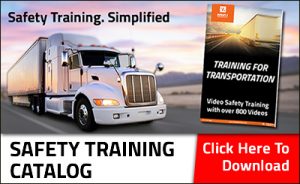The dawn of the Coronavirus pandemic brought about a shift in behaviors like the country has never seen. The variance from normal created nationwide shutdowns, self-isolating citizens, and a dramatic spike in unemployment rates.
As fear of the unknown spreads across the country, one thing remains the same;
Trucking companies must keep rolling.
Truck drivers hold the responsibility of supplying the world with all its luxuries and, more importantly, basic needs. Most everything we use daily was made available to the consumer because of a truck driver. But now, grocery stores are struggling to keep products on the shelf. Consumers are buying more groceries and household items to comply with quarantine mandates.
Truck drivers are overwhelmed with the task of keeping the supply lines moving despite the ongoing pandemic. In normal operating circumstances, they haul consumer goods from the shipper to the receiver as efficiently as possible.
The COVID-19 National Emergency has created setbacks the country could have never anticipated. The panic buying trend cause truck drivers to work overtime. They have had to figure out how to cover more miles and deliver more product than they could before the pandemic.
The Department of Transportation anticipated the struggle and stepped in to offer relief from a few strict regulations. Drivers are now allowed to operate longer hours, drive with expired licenses, and operate without a valid physical.
Impact of Social Distancing
In addition to the relaxed regulations, drivers have also been enjoying the perks of empty highways and low traffic density. Work Zone activity increased because construction crews can work more efficiently without traffic congestion.
A decrease in the number of accidents/incidents can cause truck drivers to feel a false sense of security. As the public begins to reenter the community from quarantine, traffic volume will begin increasing at a significant pace.
“Don’t let your success of today lay you into complacency for tomorrow. For that is the worst form of failure.” -Og Mandino
More frequent work zone activity, increased traffic, and complacent truck drivers are a recipe for disaster. Even though the regulations are relaxed, trucking companies can still be sued for accidents and incidents. You may have a driver who is legally allowed to operate over hours, but when an incident occurs, your company and your driver will still be held liable.
Defensive strategy
The best thing any trucking company can do for their drivers is to continue their training from rookie to retiree. Most importantly, enrich your safety culture by creating awareness within your workforce. Trucking companies experience a unique challenge in continual education, however, because their fleets are rarely available to gather for safety meetings.
The University of Michigan Transportation Research Institute conducted a study on whether truck drivers at fault in accidents than passenger cars. Their research concluded that out of 8,309 accidents, the passenger vehicle was at fault 71% of the time.
The study showed that, professional drivers were only at fault in 16% of fatal car/truck crashes. It is evident that trucking companies are defensible in court, even in fatal crashes, because the fault usually lies with the passenger vehicle.
Today’s technology allows you to tackle this problem by delivering training courses online. Drivers can still participate no matter where they are located. In the unfortunate event you end up in court, a plaintiff might ask you about your digital training class. Their stance will be that there is no way to prove participation since the training courses were not administered by an actual person.
Protect your company and your drivers by providing training and assessments that secure their acknowledgement. Test them on their retention whenever possible and always get their signature.
If it isn’t in writing, it didn’t happen.
Be proactive
Take an assessment of your company and look at areas that need to be strengthened. If you find yourself in court, an attorney will do the same. They will attempt to destroy your company’s credibility by exposing potentials for weakness.
Relaxed DOT regulations mixed with an under-trained workforce could mean the end of your company. A quick internet search returned several articles touting exactly how to sue a trucking company. The information is readily available, trucking companies are an easy target, and the “billboard attorneys” are hungry.
Mark Rhea, a trucking industry expert, describes his experience being involved in defensive litigation for a previous employer.
“Our truck was entering a construction zone. He was following the proper procedures per his training. He checked his mirrors as he was merging to make sure he could safely get in the lane. He looked back to the front and all the cars in front had halted to a stop. We rear ended someone.
In court, the deposition plaintiff’s attorney was loaded with facts and figures. He asked if I knew how many fatalities are caused by trucks ever year. If I knew how many injuries occurred because of big trucks.
Of course, I knew the numbers were up there, but I didn’t know the exact percentages like he had researched. He was trying to diminish my credibility.
Then he began asking about our training program. He was trying to prove we didn’t properly train our drivers. It was very uncomfortable for everyone involved. Fortunately, I was able to provide documentation that our driver had received specific training courses. The wreck was not for oversight or lack of preparation; it was simply an accident.” – Mark Rhea (April 17, 2020)
Trucking Companies – To Do List
As the economy reopens, traffic will resume. Accidents will become more frequent as more drivers are utilizing the roadways. Litigation will resume, if not explode. Do not get a false sense of security while the traffic is low. Prepare your company for legal defense in the following ways:
- – Encourage open communication
- – Educate drivers on exemption qualifications
- – Continue to provide proper training
- – Document everything
- – DO NOT SACRIFICE SAFETY
Document everything a driver is provided from the very first day of orientation. Your defense attorney will want to see proof of the driver’s qualifications, CSA scores, training record, etc. Having these documents readily available in court will make you more defensible and solidify your credibility.
The logistics industry is susceptible to court action because of the danger involved in operating tractor trailers. Accidents and incidents are inevitable; relaxed regulations make them more likely. Remember, your company is not released from liability just because a driver qualifies for an emergency declaration waiver.
Even though we are adapting to a national emergency, attorneys will not cut any slack. You can, however, take the necessary steps to make your company more defensible in court.








